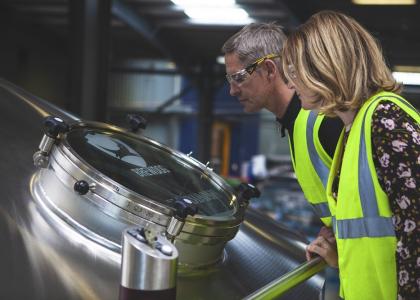Power to the People
King's College Conference Centre
University Of Aberdeen
Regent Walk
Aberdeen
AB24 3FX
Join Professor John Irvine's lecture as he discusses global warming, the potential of electrochemical technologies and the evolving market for green energy.
It is now well-recognised that global warming is being driven by increasing concentrations of carbon dioxide in the atmosphere and that there are severe risks to society and the planet from this global warming.
In global terms Scotland is a fairly small player, and whilst making Scotland carbon neutral is a useful exemplar, it will not have major effect on climate change. Scotland does have significant renewable resource and the rest of the world typically does not have such resource, hence there is an evolving market for green energy. This not only allows Scotland to significantly impact on global warming remediation, it also offers important opportunities for both wealth and job creation. The tool to enable this green energy economy is flexible storage of energy.
This lecture discuss the potential of electrochemical technologies to store electrons, create new green chemicals and fuels, and to deliver clean energy from waste to deliver this new economy. In particular it will highlight the potential of distributed technologies to make early and significant reductions in carbon dioxide impacts on the atmosphere.
About Professor Irvine:
Professor John Irvine FRSE, FRSC has made a unique and world-leading contribution to the science of energy materials, especially fuel cell and energy conversion technologies. This research has ranged from detailed fundamental to strategic and applied science and has had major impact across academia, industry and government. Irvine’s science is highly interdisciplinary extending from Chemistry and Materials through physics, bioenergy, geoscience, engineering, economics and policy.
The quality and impact of Irvine’s research has been recognised by a number of national and international awards, including the Lord Kelvin Medal from the Royal Society of Edinburgh in 2018, the Schönbeim gold medal from the European Fuel Cell Forum in 2016, the RSC Sustainable Energy Award in 2015, with earlier RSC recognition via Materials Chemistry, Bacon and Beilby awards/medals.

© 2024 Event information from Data Thistle.
The information included in the What's On Data has been supplied to VisitAberdeenshire by Data Thistle and is subject to changes. Readers are advised to check with the venue or event organiser before relying in any way on the details published here. VisitAberdeenshire and Data Thistle are unable to accept responsibility for any loss or liability arising from any errors, omissions or inaccuracies in these listings.



































